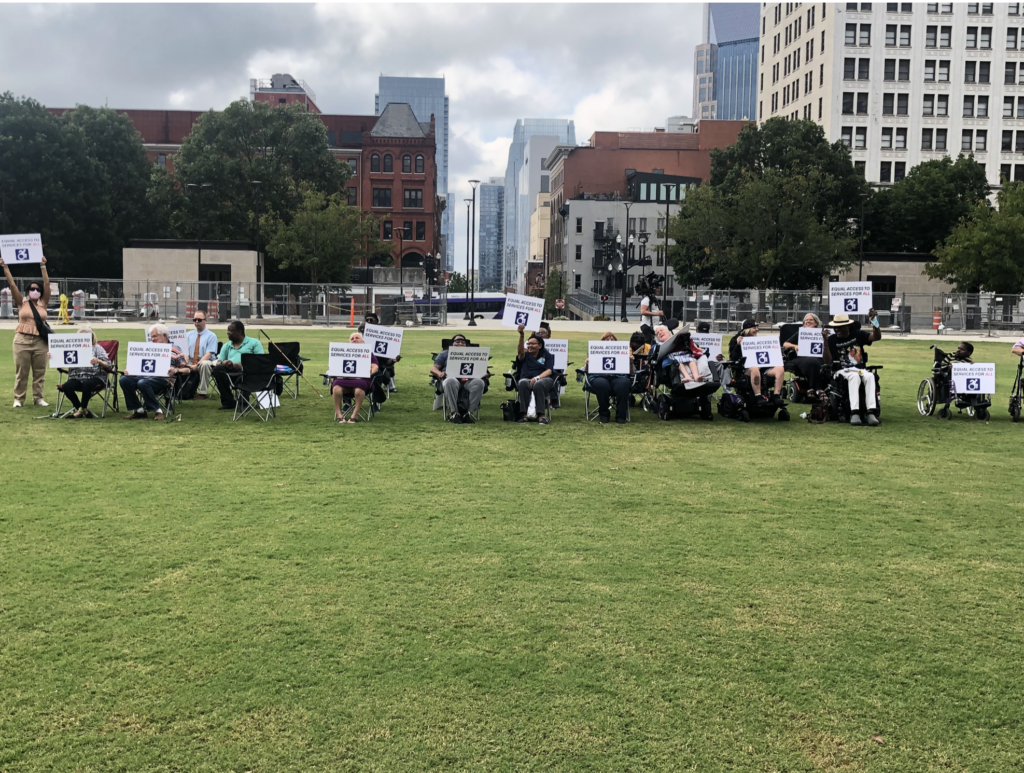
A group of people with disabilities and their supporters gathered outside Nashville’s city hall on Monday to protest shortcomings they’ve experienced in the city’s accessible transit system, broadly known as WeGo Access.
The network of small vehicles take riders with disabilities to existing bus stations and provides door-to-door trips from homes, both by appointment and on demand. Some of the vehicles are owned and operated by the city, and others are run by private contractors.
Many in the assembled crowd said they were concerned after WeGo ended its contract with a company called Mobility Solution.
“No one treats us the way that (Mobility Solution does). You know, they’re our first choice for everything because of the customer service that we receive,” said Sh’Juann Vilo, one of the organizers of the protest.
The protesters said they trust the company because it’s reliably on time and has vehicles that accommodate large wheelchairs. Those things aren’t a given from city-owned accessible transit or other companies that provide accessible transit for WeGo.
It’s been a few weeks since the city ended its contract with Mobility Solution, and some said they already noticing the difference.
“Going back and forth to grocery stores and things like that, putting groceries in your house, things that will be very easy for you, but very difficult for me,” Vilo said.
WeGo says it ended the contract after the company cut back on its service hours. The transit agency says customers can still order rides from the company using Access on Demand, a city service that costs a few dollars more than regular accessible transit.
For people who rely on the city’s regular accessible transit services, WeGo says it’s now working with multiple companies to supplement its city-owned vehicles.
Some kinks still need to be worked out, like the lack of vehicles that can accommodate larger wheelchairs. But the agency says it’s had a 92% on-time service rate since dropping Mobility Solution.
Still, that’s little comfort to people who’ve experienced failures. When people need accessible transit and it’s delayed or canceled, the consequences can be dire.
Some of the protesters shared horror stories of being abandoned, like Larry Walls, who used WeGo to book a ride home from a concert earlier this summer.
“My pickup time was 11 to 11:30. I was called at 11:28 and told, ‘Sorry, we don’t have transportation for you,’ ” he said. “So I ended up spending the night literally at the (concert) venue, getting an Uber, leaving my wheelchair — which I rely on for my mobility, overnight — and going to pick it up the next day.”
Protesters say the change they want goes beyond bringing back Mobility Solution. They want more drivers and vehicles across the board. They also want a person with a physical disability to sit on the WeGo board.
“So when they make important decisions we can express to them (our) needs and desires,” said protester Theresa Khayyam. “Individuals with wheelchairs, how they need to get around, also individuals who have to go to dialysis and things of that concern.”
In spring 2023, WeGo convened public meetings about its accessibility services, and heard idea about making schedules more helpful, among other potential changes. Adding more dispatchers and increasing on-demand options through rideshare companies were also discussed.

